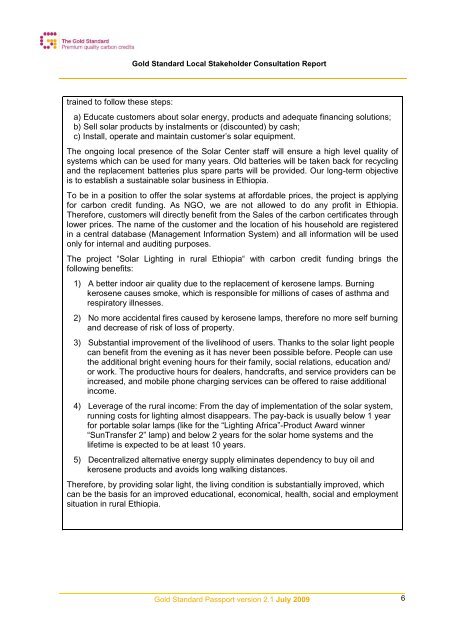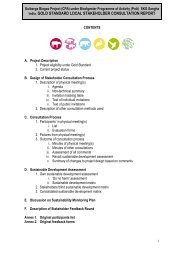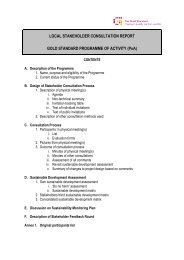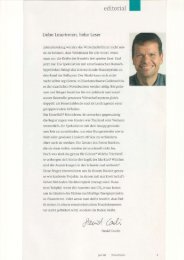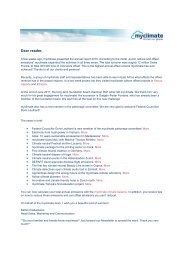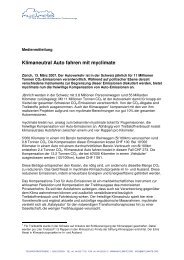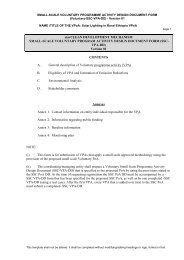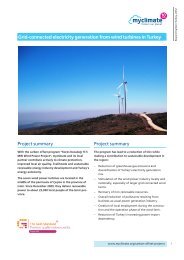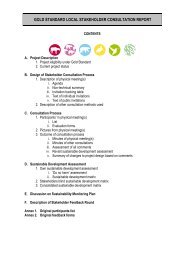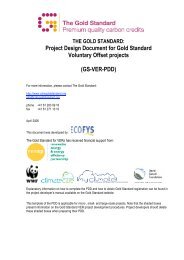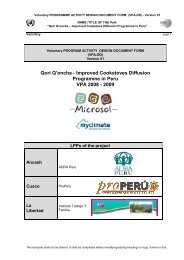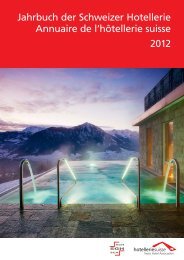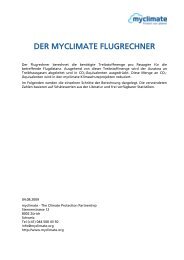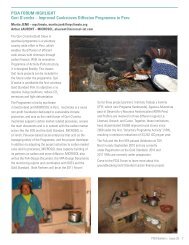GSV2 LSC-Report-VPA1 - MyClimate
GSV2 LSC-Report-VPA1 - MyClimate
GSV2 LSC-Report-VPA1 - MyClimate
Create successful ePaper yourself
Turn your PDF publications into a flip-book with our unique Google optimized e-Paper software.
trained to follow these steps:<br />
Gold Standard Local Stakeholder Consultation <strong>Report</strong><br />
a) Educate customers about solar energy, products and adequate financing solutions;<br />
b) Sell solar products by instalments or (discounted) by cash;<br />
c) Install, operate and maintain customer’s solar equipment.<br />
The ongoing local presence of the Solar Center staff will ensure a high level quality of<br />
systems which can be used for many years. Old batteries will be taken back for recycling<br />
and the replacement batteries plus spare parts will be provided. Our long-term objective<br />
is to establish a sustainable solar business in Ethiopia.<br />
To be in a position to offer the solar systems at affordable prices, the project is applying<br />
for carbon credit funding. As NGO, we are not allowed to do any profit in Ethiopia.<br />
Therefore, customers will directly benefit from the Sales of the carbon certificates through<br />
lower prices. The name of the customer and the location of his household are registered<br />
in a central database (Management Information System) and all information will be used<br />
only for internal and auditing purposes.<br />
The project “Solar Lighting in rural Ethiopia“ with carbon credit funding brings the<br />
following benefits:<br />
1) A better indoor air quality due to the replacement of kerosene lamps. Burning<br />
kerosene causes smoke, which is responsible for millions of cases of asthma and<br />
respiratory illnesses.<br />
2) No more accidental fires caused by kerosene lamps, therefore no more self burning<br />
and decrease of risk of loss of property.<br />
3) Substantial improvement of the livelihood of users. Thanks to the solar light people<br />
can benefit from the evening as it has never been possible before. People can use<br />
the additional bright evening hours for their family, social relations, education and/<br />
or work. The productive hours for dealers, handcrafts, and service providers can be<br />
increased, and mobile phone charging services can be offered to raise additional<br />
income.<br />
4) Leverage of the rural income: From the day of implementation of the solar system,<br />
running costs for lighting almost disappears. The pay-back is usually below 1 year<br />
for portable solar lamps (like for the “Lighting Africa”-Product Award winner<br />
“SunTransfer 2” lamp) and below 2 years for the solar home systems and the<br />
lifetime is expected to be at least 10 years.<br />
5) Decentralized alternative energy supply eliminates dependency to buy oil and<br />
kerosene products and avoids long walking distances.<br />
Therefore, by providing solar light, the living condition is substantially improved, which<br />
can be the basis for an improved educational, economical, health, social and employment<br />
situation in rural Ethiopia.<br />
Gold Standard Passport version 2.1 July 2009<br />
6


